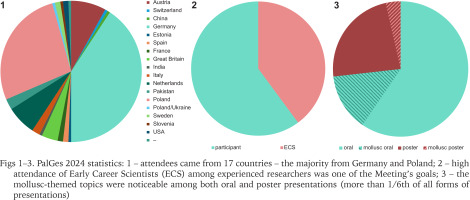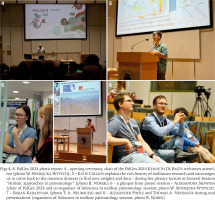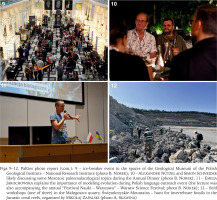CONFERENCE REPORT
The international paleontological conference PalGes 2024 – Joint Meeting of Polish Paleobiologists and the 95th Annual Meeting of the Paläontologische Gesellschaft was held at the Faculty of Biology, University of Warsaw, on September 16–21, 2024 – for the first time in Warsaw, Poland. The Meeting was co-organised by the University of Warsaw (Faculty of Biology, Faculty of Geology), Institute of Paleobiology Polish Academy of Sciences, Paleontological Section of the Polish Geological Society, Polish Geological Institute–National Research Institute and the Paläontologische Gesellschaft. The official conference language was English.
The main theme of the meeting: “More than extinct species: the importance of fossils for ecology, evolution and conservation across borders?” built the basis for a wide range of paleontological research topics to meet here in Warsaw – represented by the topics of the lectures scheduled in the thematic sessions, poster presentations, as well as conference workshops, meeting of the working groups, the field workshops and the outreach events in national languages. This diverse offer of activities underlined the interdisciplinarity and innovativeness of paleontological studies today and the constant need for international cooperation.
We were happy to welcome 162 registered participants affiliated with scientific institutions from 17 countries (Fig. 1). The majority of attendees came from Germany (41%) and Poland (28%), followed by Austria (8%), the Netherlands (7%) and Great Britain (4%). This fulfilled one of the basic goals of this Joint Paleontological Meeting event – to ensure a common space for exchanging research experiences, enable discussions, and support planning future international cooperations.
Figs 1–3
PalGes 2024 statistics: 1 – attendees came from 17 countries – the majority from Germany and Poland; 2 – high attendance of Early Career Scientists (ECS) among experienced researchers was one of the Meeting’s goals; 3 – the mollusc-themed topics were noticeable among both oral and poster presentations (more than 1/6th of all forms of presentations)

The other goal – to enhance the visibility of Early Career Scientists (ECS), support their scientific presence, and develop future cooperations – was reached successfully during PalGes 2024. We are proud to host 61 (41%) young scientists (Fig. 2). Presentations of some of them were awarded by the Paläontologische Gesellschaft: Young Scientist Award (1st – Adam Rytel, Institute of Paleobiology Polish Academy of Sciences; 2nd – Andrea Herbert Mainero, Ludwig-Maximilians-Universität München; 3rd – Diego Volosky, Friedrich-Schiller-Universität Jena); Poster prize (1st – Leonard von Ehr, Ludwig-Maximilians-Universität München; 2nd – Kim J. Stroben, University of Vienna; 3rd – ex aequo Bernhard Grabensteiner, University of Vienna and Swane V. Jung, University of Greifswald and University Medical Center Rostock); and by PeerJ Prize (“Best Oral Presentation”, Niklas Hohmann, Utrecht University). Congratulations!
Although the Meeting included diverse activities (including workshops on 7 topics, 3 outreach lectures, guided fossil exhibitions, 3 field workshops, meetings of working groups, and social events), its main scientific part – oral and poster presentations – took place from Tuesday 17th (official opening, Fig. 4) to Thursday 19th September. Almost 50 posters were presented at Tuesday’s poster sessions. More than 120 oral presentations were scheduled into 14 thematic (parallel) sessions. Each day started with a general session and plenary talk of the invited researcher. One of them was malacologist Katie Collins from the Natural History Museum, London, who opened a general “Holistic approaches to paleontology” session (chaired by Kenneth De Baets, specialist in ammonoids and biotic interactions, with Niklas Hohmann, experienced in stratigraphic paleontology) with her lecture entitled “Back to the drawers! Specimens as resources and databases as gateways”, which was exemplified with the bivalve data cases (during a “molluscan day” on Wednesday, 18th September, Fig. 5). These morning general sessions were followed by specialized and open sessions, including those like “Ichnology” dedicated to prof. Grzegorz Pieńkowski (1953–2023) on Tuesday 17th September, and “Advances in mollusk palaeontology” specialised session on Wednesday 18th September. This paleomalacological session was organized by Alexander Pohle (Ruhr University Bochum; group of expertise: cephalopods), Baran Karapunar (University of Leeds; expert in gastropods and bivalves), Thomas A. Neubauer (Bavarian State Collection for Palaeontology and Geology, Munich; specialist in field of non-marine gastropods) and Aleksandra Skawina (University of Warsaw; experienced with freshwater bivalves) – chairs, organisers (Figs 4–8) – and co-chaired by Sofiya Bakayeva and Andrzej Kaim (both Institute of Paleobiology, Polish Academy of Sciences, Warsaw; field of expertise: marine gastropods). The session consisted of 16 oral presentations. However, mollusc-themed lectures also appeared during other sessions, reaching the number of 23 (19% of total paleontological topics), and were accompanied by 6 (13%) mollusc-themed posters (Fig. 3). This provided an incredibly valuable opportunity and productive time to discuss the newest research and arrange future collaborations and fields of joint research. This “molluscan day” was finalised by the traditional for PalGes meetings, the Annual English Evening Outreach Lecture: “The premises, promises, and pitfalls of conservation paleobiology” by Michał Kowalewski (University of Florida; expert in, e.g., paleoecology and taphonomy based on marine shelly invertebrate groups like bivalves, brachiopods or echinoderms).
Figs 4–8
PalGes 2024 photo report: 4 – opening ceremony, chair of the PalGes 2024 Kenneth De Baets welcomes attendees (photo W. Sinołęcka-Wypych); 5 – Katie Collins explains the rich history of molluscan research and encourages us to come back to the museum drawers to find new insights and data – during her plenary lecture at General Session “Holistic approaches to paleontology” (photo B. Norek); 6 – a glimpse from poster session – Aleksandra Skawina (chair of PalGes 2024 and co-organiser of Advances in mollusc paleontology session; photo W. Sinołęcka-Wypych); 7 – Baran Karapunar (photo T. A. Neubauer) and 8 – Alexander Pohle and Thomas A. Neubauer during oral presentations (organisers of Advances in mollusc paleontology session; photo B. Norek)

Organisers of the conference ensured diverse accompanying and social events during PalGes 2024. These allowed various possibilities for free discussions, setting the future field of cooperation, learning from each other, and sharing experiences. 6 of 7 proposed workshops took place already on Monday 16th September (and the last one was scheduled on Thursday), enabling the attendees to experience diverse topics (from e.g. building models for stratigraphic paleobiology in R, through exceptional preservation and exploration of 3D models and CT visualization to paleoart and exploring the fossil collection of Institute of Paleobiology, Polish Academy of Sciences) and to increase their scientific competencies and possibilities. Attendees could enjoy the in-person chats during the Ice-breaker event – hosted in the spaces of the Geological Museum of the Polish Geological Institute – National Research Institute (Fig. 9) as well as during the Annual Dinner in the paleo-grill-bar environment (Fig. 10).
Figs 9–12
PalGes photo report (cont.): 9 – ice-breaker event in the spaces of the Geological Museum of the Polish Geological Institute – National Research Institute (photo B. Norek); 10 – Alexander Nützel and Simon Schneider likely discussing some Mesozoic paleomalacological topics during the Annual Dinner (photo B. Norek); 11 – Emilia Jarochowska explains the importance of modeling evolution during Polish language outreach event (the lecture was also accompanying the annual “Festiwal Nauki – Warszawa” – Warsaw Science Festival; photo B. Norek); 12 – field workshops (one of three) in the Małogoszcz quarry, Świętokrzyskie Mountains – hunt for invertebrate fossils in the Jurassic coral reefs, organised by Mikołaj Zapalski (photo A. Skawina)

We also ensured three outreach events to take this opportunity of hosting specialists to go toward non-specialists and share with this group our enthusiasm of science. These were available in German (by Elżbieta Teschner, University of Opole; vertebrate paleontologist), English (by Michał Kowalewski, University of Florida; this was the traditional Annual English Evening Outreach Lecture) and Polish (by Emilia Jarochowska, Utrecht University; expert in stratigraphic paleontology; Fig. 11). Two latter ones were additionally associated with the “Festiwal Nauki – Warszawa” – Warsaw Science Festival annual outreach event and both were streamed online (see, accordingly: https://fb.watch/uOg0o8Ctky/ and https://fb.watch/uOf_pS0KM8/).
On Friday, 20th September, three exciting trips – guided groups for the field workshops were departured. A one-day field trip to the uppermost Jurassic lagoon deposits of Owadów-Brzezinki Geopark was led by Błażej Błażejowski (Institute of Paleobiology Polish Academy of Sciences; experienced in groups of microfossils and arthropods). Marcin Machalski (Institute of Paleobiology Polish Academy of Sciences; groups of expertise: ammonoids, vertebrates) organized the one-day field trip to the Cretaceous–Paleogene boundary at Nasiłów and Bochotnica and the historical city of Kazimierz Dolny. Another group of 30 persons travelled for the two-day field trip to Devonian, Jurassic, and Miocene outcrops in the unique European region of the Świętokrzyskie Mountains – coordinated and guided by Mikołaj Zapalski (Faculty of Geology, University of Warsaw; specialist in the field of cnidarians and coral reefs) and Przemysław Świś (FB UW alumnus, University of Modena and Reggio Emilia; specialist in group of conodonts). These were great opportunities to enjoy fossil hunting and get a unique hands-on experience.
Organisers would like to cordially thank all the PalGes 2024 attendees and those who were interested in PalGes 2024! We do appreciate the significant contribution of paleomalacologists into this event! Organising such a meeting across the borders of the two countries can be challenging, but with the huge and kind work of all the co-organisers, partners, organising and scientific committees’ members, workshop and session organisers, excursion leaders, volunteers, and attendees – thus without you – this challenge would not be possible. The majority of the costs of the conference were ensured by the conference fee; the remainder was supported by The Foundation for Polish-German Cooperation (Ice-breaker costs) as well as Excellence Initiative – Research University Programme at the University of Warsaw (the support of invited speakers and conference materials costs). We are deeply grateful to other partners for their support in providing services, type-setting the abstract book, ensuring the award-books, or organising stands during the event. We are happy to provide details with the full programme of the meeting and texts of abstracts, as well as a full list of partners that we are thankful to for their supportive contributions to this scientific event – in an on-line conference abstract book, available in an open-access repository under the DOI: https://doi.org/10.4202/app.01209.2024. Organisers would like to repeat – we are deeply grateful to all persons who shared their own time and efforts to kindly help in organising PalGes 2024 – the first PalGes here in Poland! Thank you!
Faculty of Biology, Institute of Evolutionary Biology, University of Warsaw
(a.skawina@uw.edu.pl; k.de-baets@uw.edu.pl)

